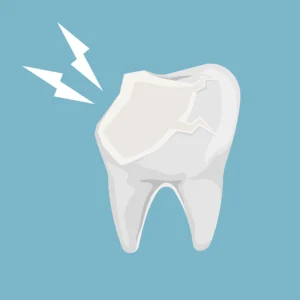Table of Contents
Do I need a night guard? It’s one of the most common questions patients ask our dental team at Hardin Family Dental — and for good reason. If you wake up with jaw pain, headaches, or sensitive teeth, you might be grinding your teeth while you sleep. Teeth grinding, also called bruxism, can happen without you even knowing it, and over time it can cause serious damage. Understanding the signs early and exploring how a night guard can help is the first step to protecting your smile.
The answer depends on your symptoms, risk factors, and how much wear your teeth have already experienced. In this guide, we’ll walk you through the signs of nighttime grinding, how night guards work, and how they can protect your teeth and overall health.
What Is Teeth Grinding (Bruxism)?
Teeth grinding, or bruxism, is the involuntary clenching, grinding, or gnashing of teeth — often while you’re asleep. It’s more common than you might think. Up to 30% of adults and 15% of children grind their teeth at some point in their lives.
While occasional grinding might not cause harm, frequent bruxism can lead to serious dental problems, including enamel wear, fractures, and even tooth loss. It can also affect your jaw joints, leading to long-term discomfort and complications.
7 Signs You Might Need a Night Guard
Because teeth grinding usually happens during sleep, most people don’t know they’re doing it. The best way to catch it early is to watch for these warning signs:
1. Worn or Flattened Teeth
If your teeth appear shorter or smoother than they used to, grinding may be wearing down the enamel.
2. Morning Jaw Pain or Stiffness
A sore jaw, especially in the morning, is a classic sign of overnight clenching. This tension can also lead to a condition known as temporomandibular joint disorder (TMJ).
3. Frequent Headaches
Waking up with dull headaches around your temples or behind your eyes could be linked to the constant muscle activity caused by grinding.
4. Tooth Sensitivity
As enamel wears down, teeth become more sensitive to hot, cold, or sweet foods.
5. Chipped or Cracked Teeth
Grinding creates pressure that can fracture teeth or dental restorations like crowns and fillings.
6. Disrupted Sleep
Although you might not notice it, bruxism can cause micro-awakenings throughout the night, leading to poor sleep quality and fatigue.
7. Noises During Sleep
If a partner or family member hears grinding sounds at night, it’s a clear indicator that you may need a night guard.
What Causes Teeth Grinding?
Understanding why you grind your teeth is key to preventing it. Some of the most common causes include:
- Stress and anxiety: Emotional tension often manifests physically through clenching or grinding.
- Misaligned bite: Teeth that don’t align properly can cause friction when you sleep.
- Sleep disorders: Conditions like sleep apnea are linked to nighttime grinding.
- Lifestyle factors: Excess caffeine, alcohol, or tobacco can increase muscle activity and grinding.
- Medications: Certain antidepressants and stimulants may contribute to bruxism.
Identifying the root cause helps our dental team recommend the most effective treatment plan for you.
How Night Guards Help Protect Your Smile
A night guard is a custom-made oral appliance that fits over your teeth while you sleep. It acts as a protective barrier, absorbing the force of grinding and preventing further damage. Here’s how it helps:
- Prevents tooth wear: Guards protect enamel from erosion and fractures.
- Relieves jaw tension: Reducing pressure helps relax muscles and reduce morning pain.
- Improves sleep quality: Less clenching means fewer sleep interruptions.
- Protects dental work: Crowns, bridges, and fillings last longer with less grinding damage.
Most importantly, a night guard doesn’t just protect your teeth — it protects your long-term oral health.
Custom Night Guards vs. Store-Bought Options
If you’ve been wondering do I need a night guard, you’ve probably seen over-the-counter options. While they’re inexpensive and easy to find, they’re not always the best choice.
Here’s how custom guards from Hardin Family Dental compare:
| Feature | Custom Night Guard | Store-Bought Guard |
|---|---|---|
| Fit | Precisely molded to your teeth for maximum comfort | One-size-fits-all or boil-and-bite |
| Effectiveness | Provides full protection and reduces grinding force | Offers limited protection |
| Durability | Long-lasting and designed to withstand heavy grinding | May wear out quickly |
| Comfort | Comfortable enough for nightly use | Can feel bulky or loose |
| Cost | Higher upfront investment | Lower cost but less effective |
For most patients, a custom-fitted night guard is worth the investment. It’s more effective, more comfortable, and more likely to prevent long-term dental issues.
Other Ways to Reduce Teeth Grinding
While a night guard is often the best solution, lifestyle changes can also help reduce bruxism:
- Manage stress: Try relaxation techniques such as meditation, yoga, or breathing exercises.
- Create a sleep routine: Going to bed at the same time and improving sleep hygiene can reduce grinding.
- Avoid stimulants: Cut back on caffeine and alcohol, especially before bedtime.
- Check your bite: Misaligned teeth may benefit from orthodontic treatment.
- Stay hydrated: Dehydration can contribute to muscle tension.
Discuss these strategies with our dental team — we can help you create a personalized plan.
When to Talk to Your Dentist
If you’re experiencing any of the signs listed above, it’s time to schedule a dental evaluation. Grinding may seem harmless at first, but it can quickly lead to more serious problems like cracked teeth, receding gums, and TMJ disorders. Early intervention is always easier, more affordable, and more effective.
At Hardin Family Dental, we’ll evaluate your teeth, bite, and symptoms, then recommend whether a night guard or other treatments are necessary. Our goal is to protect your smile and improve your overall quality of life.
Night guards are one part of a comprehensive oral care plan. For a complete overview of all the ways we help protect your smile, visit our General and Family Dentistry Guide.
Final Thoughts: Protect Your Smile While You Sleep
If you’ve been asking yourself, do I need a night guard, the answer might be yes — especially if you’ve noticed signs like jaw pain, headaches, or worn teeth. Night guards are a simple, effective solution that can save you from costly dental treatments and ongoing discomfort.
Your smile deserves protection around the clock. Contact Hardin Family Dental in Hardin, MT today to schedule an evaluation. We’ll help you find the best solution for your needs and give you peace of mind knowing your teeth are protected, even while you sleep.



